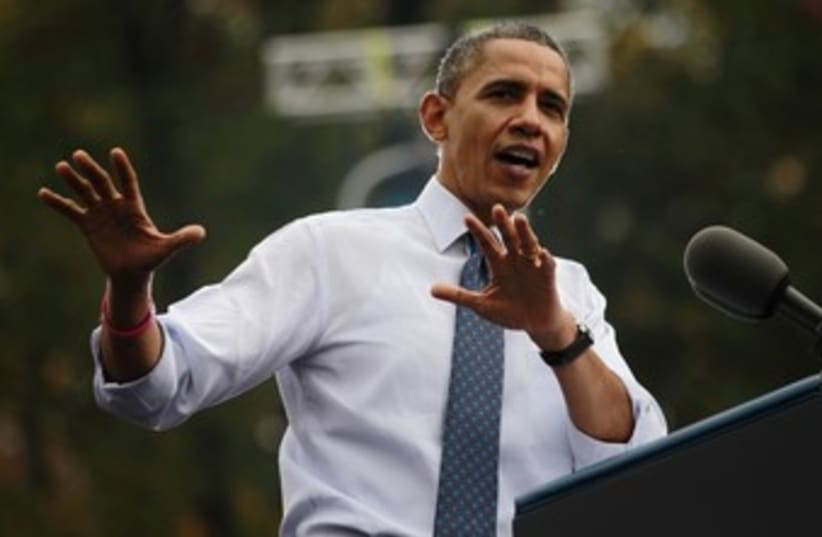The New York Times reported on Sunday, October 21, that the United States and Iran had for the first time agreed in principal on one-on-one negotiations over Iran’s nuclear program. This was according to Obama administration officials who are apparently setting the stage for what could be a last-ditch diplomatic effort to avert a military strike on Iran. The same information source stated that Iranian officials have insisted that the talks wait until after the US presidential election on November 6. The Iranians have told their US counterparts that they want to know with whom they would be negotiating.
According to The New York Times, when this announcement leaked from the White House with less than twenty-four hours before the final presidential debate, one must assume that this is President Obama’s October surprise. It is, however, just the opposite; it’s an Iranian gift to the president to help him win the presidency.
The last presidential debate, with Iran in the cross-hairs, was on October 30, 1980. Going in to the debate, incumbent President Jimmy Carter led Ronald Reagan 47 percent to 39 percent. When the election was held, it was in actuality one of the most lop-sided Electoral College losses in history for a sitting president. Ronald Reagan won 489 electoral votes or 90.9 percent.
What changed the polls so near the election? It hinged then—and could now—on the Iranian presidential vote. On September 23, 1980, I had dinner with Isser Harel, the head of Israeli Mossad (the intelligence organization), at his home in Tel Aviv. Also present was Dr. Reuven Hecht, the senior adviser to Prime Minister Menachem Begin. Mr. Harel had given me a copy of his new fiction novel, Jihad, with the tagline: “In the Middle East terrorists wage a deadly war that could engulf the whole world.”
As Harel autographed the book, I asked, “Do you think terrorism will ever come to America?” He responded, “Terrorists have the will, but not the power. America has the power, but not the will. All of that could change with time. Arab oil buys more than tents. You kill a fly and rejoice; we kill one and a hundred come to the funeral. Phallic is not a cat. The terrorists will strike New York City’s tallest building—a fertility symbol. It will be your first terrorist attack.”
I was so shocked by his prophetic statement that I tried to move the conversation to a lighter topic. I asked, “Who do you think will be the next president of the United States?”
Harel’s response was that the word on the street indicated when Ronald Reagan placed his hand on the Bible to be sworn in as president, the US hostages in Iran would be released. I had no full comprehension as to what Harel was saying until my phone rang during the inaugural ceremony. Dr. Hecht was shouting, “Are you watching it? Harel’s a prophet. It’s happening just as he said!”
I hung up the phone and began to research precisely what had happened. After the November 1, 1979 hostage take-over at the US Embassy in Tehran, the US employees had been held hostage 444 days. President Carter had been working non-stop through diplomatic channels in an attempt to end the crisis with Iran. He asked the Syrians, Turks, Pakistanis, Libyans, Algerians, and even the PLO to intercede. Like a chess master contemplating his final checkmate, Ayatollah Ruhollah Khomeini sat back and watched the machinations. In a desperate effort to release the hostages before the inauguration, Carter sent Warren Christopher and a small contingent of State Department officials to Algeria for face-to-face negotiations with an Algerian team representing the Khomeini government.
The Iranians were relentless in the pursuit of the Shah’s assets, purported to be stashed in American banks. In a move seemingly designed to further insult the United States, Khomeini’s negotiators demanded a total of $24 billion dollars be transferred to a bank in Algeria. The deadlock between the two countries seemed insurmountable until January 15, 1981.Iran capitulated and agreed to Carter’s demands to pay off loans owed to U.S. banks. In marathon sessions new drafts were produced, new documents drawn, and the Bank of England was approved as the repository of escrow funds. Shortly after 4:00 A.M. on Inauguration Day, January 20, 1981, the Carter administration relinquished $7.977 billion to the Iranians. The transfer required fourteen banks and the participation of five nations acting concurrently.
Isser Harel apparently knew this was transpiring behind the scenes when he made his prophetic statement. As he indicated, it appeared that Iran did indeed have a vote in the US presidential election and wanted to humiliate Jimmy Carter. Khomeini obviously considered Ronald Reagan to be a lightweight. It appears that the reverse is taking place in the 2012 presidential election. Iranian leaders seem to consider President Obama a much safer bet as Commander in Chief than Mitt Romney.
Ronald Reagan was, in my opinion, a great US president. Although his Iranian foreign policy surprise was sending Khomeini a Bible verse and a chocolate birthday cake in an attempt to buy back US hostages in Lebanon, he also sent three planeloads of weapons. It’s possible Reagan could have lost his reelection bid because he apparently ignored the warnings of Iranian Hezbollah terrorists in Iran who had threatened the US Marines stationed in Lebanon. After the attack in Beirut that killed 243 Marines on October 23, 1983, the US cut and ran. I know because I was there; I had slept on the beachhead that night rather than in the barracks.
Dr. Michael D. Evans is a #1 New York Times bestselling author. In 2010, he arranged an exclusive interview with Iran’s President Mahmoud Ahmadinejad for the Fox News Network.
